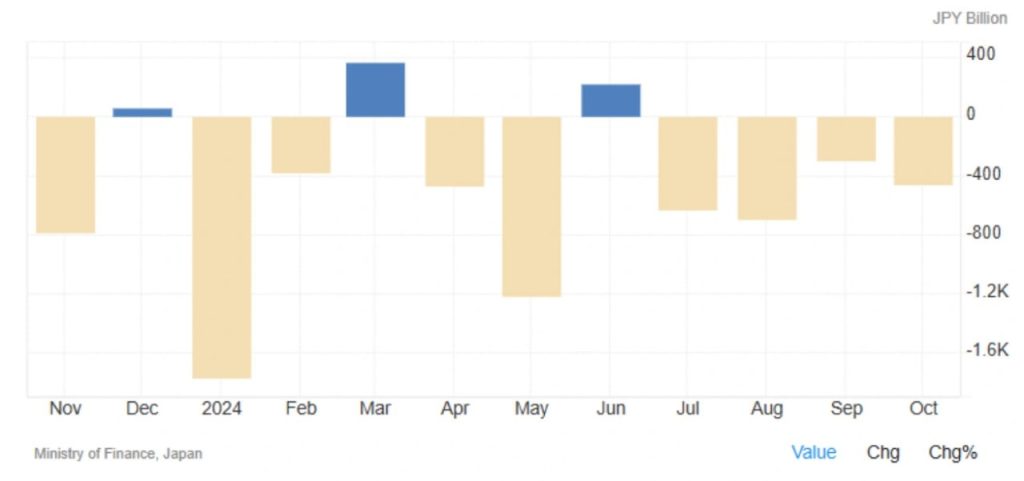
Japan’s Trade Deficit Narrows in October 2024
Japan’s trade deficit saw a significant decrease in October 2024, dropping to JPY 461.25 billion, compared to JPY 702.86 billion in the same month the previous year. The improvement was largely driven by a sharp rise in exports, which outpaced the growth in imports. However, while the results reflected positive trends, Japan’s trade deficit was still wider than market expectations, which had predicted a shortfall of JPY 360.4 billion.

Exports Surge, Exceeding Expectations
In October, Japan’s exports climbed by 3.1% year-on-year, reaching a total of JPY 9,426.67 billion. This was the highest level seen in the past three months and represented a strong rebound from the 1.7% decline in September. The increase in exports not only reversed the previous month’s downturn but also surpassed market forecasts, which had anticipated a more modest growth of 2.2%. The growth in exports is a positive sign for Japan’s economy, suggesting that demand for its goods abroad remains resilient.
Imports Show Slower Growth Than Expected
Imports into Japan grew by a smaller margin of 0.4% in October, a deceleration from the previously revised 1.8% increase seen in September. While this represents a slowdown, it was still better than the market’s forecast, which had predicted a 0.3% drop. The slower pace of import growth indicates that domestic demand may have softened, as businesses and consumers adjusted to global economic pressures. Nevertheless, the fact that imports still rose, albeit modestly, shows that Japan continues to rely on imported goods to support its domestic economy.
Impact on Japan’s Economy and Future Outlook
Despite the encouraging export numbers and a slight deceleration in imports, Japan’s trade deficit was larger than anticipated, highlighting the continuing challenges in balancing trade. The discrepancy between the actual deficit and market expectations underscores the complexity of Japan’s trade dynamics. While exports are on the rise, they are not yet enough to fully offset the country’s import costs. Going forward, the focus will be on whether the momentum in exports can be sustained and whether import growth will continue to slow. Investors and analysts will be closely monitoring these trends, as they will play a critical role in shaping Japan’s economic performance in the coming months.
Share
Hot topics

Best broker for gold trading
There’s always been a certain magic about gold. Before online charts and trading applications, people stored their wealth in coins and bars, trusting that gold would retain its value during...
Read more




Submit comment
Your email address will not be published. Required fields are marked *